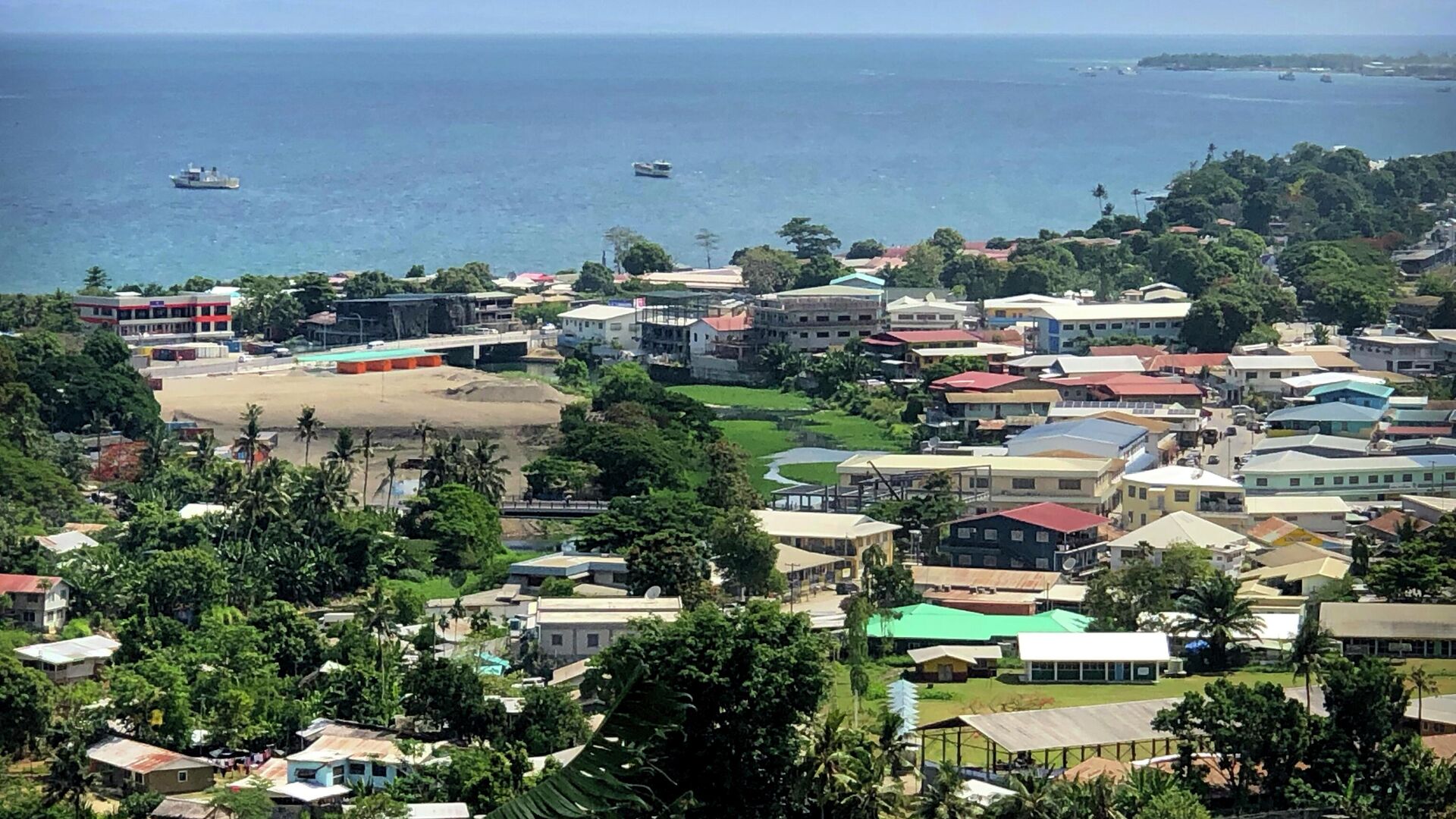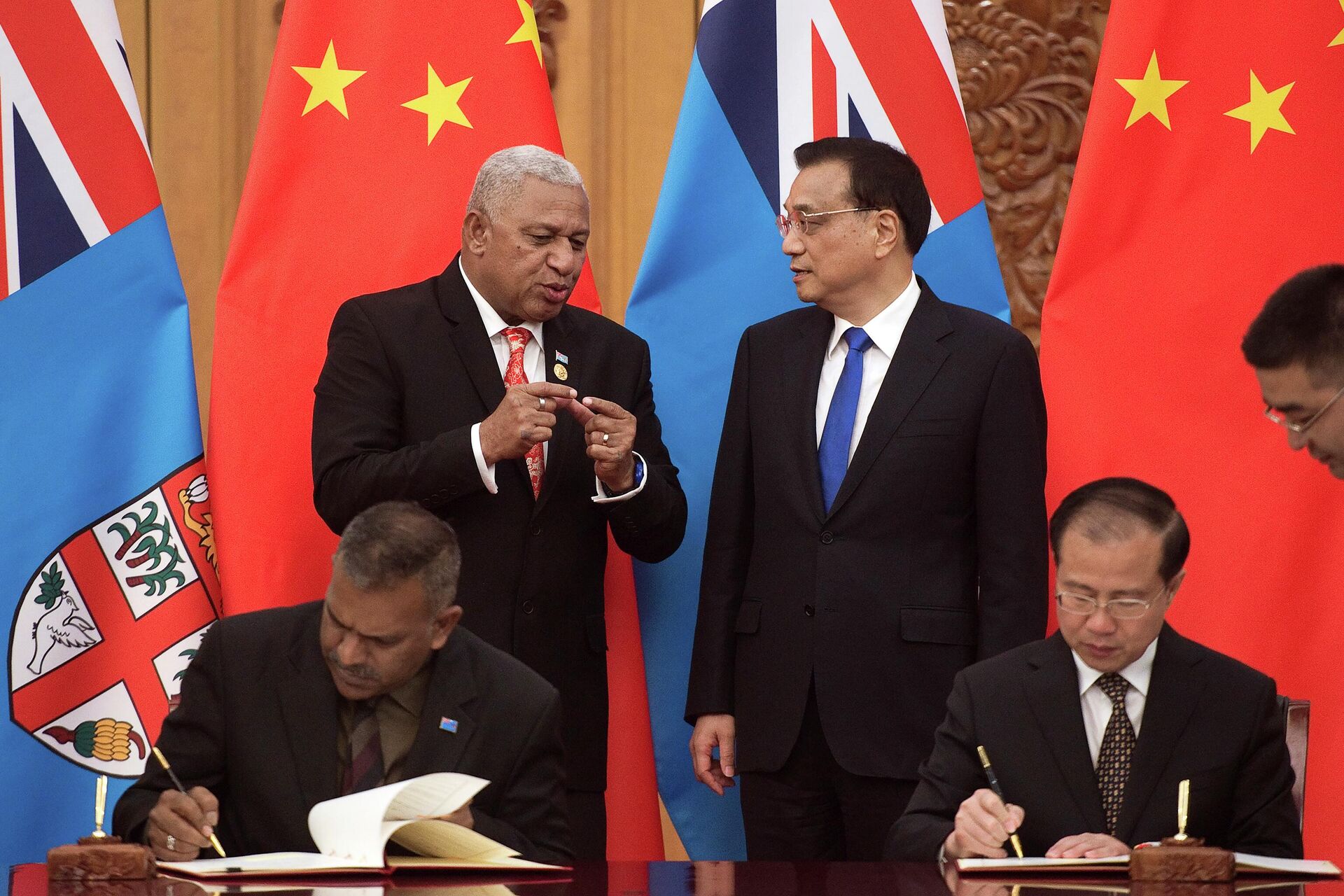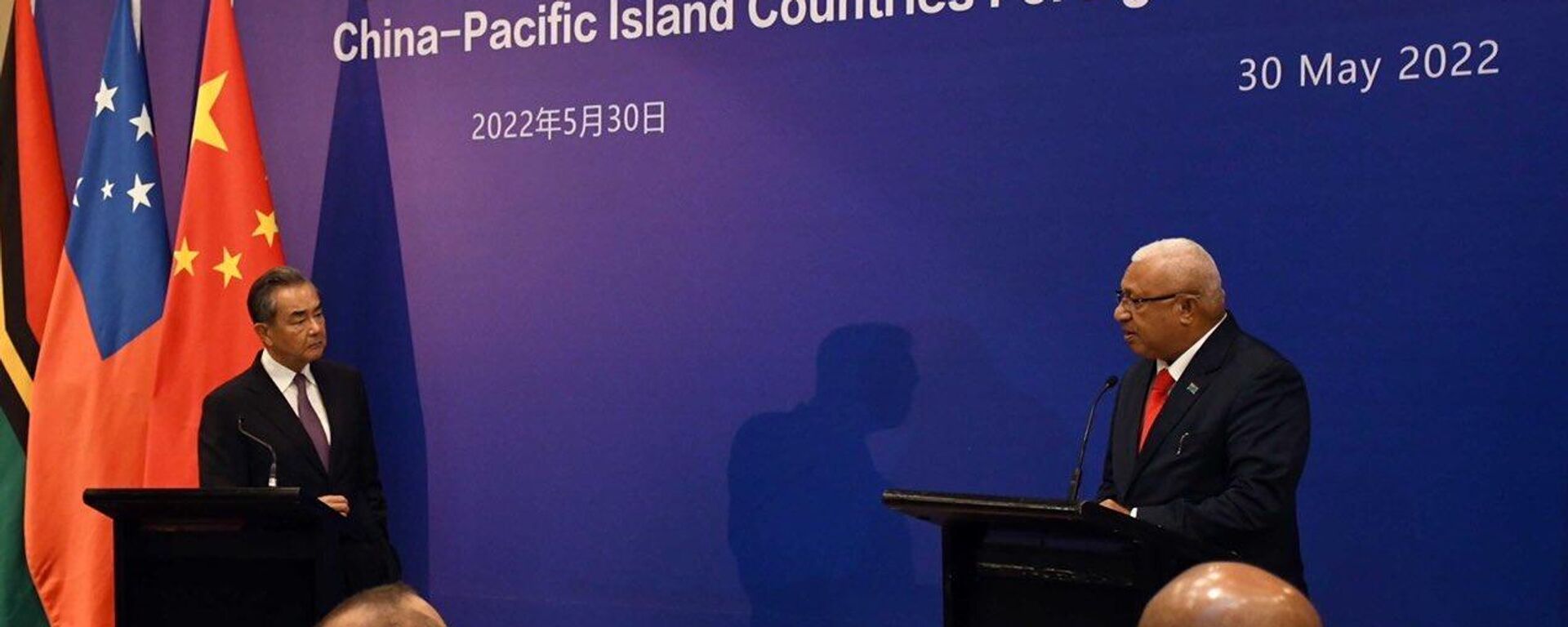https://sputnikglobe.com/20220606/power-games-in-the-south-pacific-why-china-looks-to-sign-security-deals-with-island-nations-1096063233.html
Power Games in the South Pacific? Why China Looks to Sign Security Deals With Island Nations
Power Games in the South Pacific? Why China Looks to Sign Security Deals With Island Nations
Sputnik International
Beijing’s recent efforts to establish closer ties to the constellation of pacific islands has prompted regional powers Australia, New Zealand and the US to... 06.06.2022, Sputnik International
2022-06-06T15:41+0000
2022-06-06T15:41+0000
2022-06-06T16:06+0000
asia
us
australia
china
new zealand
pacific ocean
pacific islands
https://cdn1.img.sputnikglobe.com/img/07e6/04/16/1094976509_0:0:3073:1728_1920x0_80_0_0_ab9332396de7341015b921952afe1b7e.jpg
A group of small islands and archipelagos swept under the umbrella term Pacific island nations are not new to great power struggles, having endured such games in colonial times and the Cold War, where they acted as a barrier between East and West.It would seem that they face yet another power struggle today, trying to navigate between China on one hand and Australia, New Zealand and the US on the other.The tussle comes as Beijing is seeking to deepen ties with its neighbours, with western analysts claiming that its main tool has been offering lucrative economic deals such as generous contributions to infrastructure projects, expensive but easy-access development loans, and access to the Belt and Road Initiative.New Approach to Extending Influence?However, analysts now claim that China is signing security pacts to deploy its military, specifically on the islands in the Pacific.Western nations started sounding the alarm after Beijing signed a security agreement with the Solomon Islands, despite attempts by Australia and the US to torpedo the deal. The agreement allows the Solomon Islands to request Chinese assistance in quelling civilian unrest, such as that which hit the island earlier this year. However, western governments allege that the pact also allows Beijing to deploy its military, despite China denying the allegations.Chinese Foreign Minister Wang Yi’s recent 10-day tour through scarcely populated atolls and volcanic islets which lie on the strategic naval pathways in the Pacific reportedly sparked further concerns. The trip was allegedly dedicated to forging a new regional security and economic deal which Beijing wants to sign with the Pacific island nations and which had been discussed during a 30 May summit in Fiji.While the deal has not been agreed upon, leaked reports from discussions suggest a broad agreement on free trade and humanitarian aid.The news of the Chinese proposal to the South Pacific nations has prompted two other powers with interests in the Pacific to intensify their efforts. For her part, Australia's Foreign Minister Penny Wong launched her own diplomatic tour through the islands, while the US foreign aid agency announced plans to invest more in the development of local civil society and media early in May.Both the US and Australia have long established security and military ties to these islands, including joint training exercises and drills, with Washington even possessing a military base in the region. New Zealand also has active bilateral and multilateral security pacts with some of the South Pacific nations.Why Does China Need a Stake in South Pacific?Beijing strengthened attempts to expand its influence over a decade ago, trying to establish favourable relations with its neighbours.Currently, its biggest project is the Belt and Road Initiative – an attempt to build reliable, fast, ground and maritime west- and north-westward routes for Chinese goods. However, it also looks to build ties in the Pacific.Western analysts speculate that these efforts are linked to security concerns raised by China over the perceived attempts by the US and its regional allies to contain Beijing. Chinese analysts believe that the US has been trying to encircle it for years by surrounding the country with states that signed cooperation agreements with Washington and even allowed the latter to deploy its military on their territory.As such, Beijing's attempts to deepen cooperation with the South Pacific might be a guise to break out of US encirclement, while gaining a foothold in critical maritime routes.However, these agreements are far from guaranteed. While the failure to achieve progress on a broad cooperation deal discussed in Fiji does not mean Beijing suffered a setback, it did expose one of the main roadblocks - the concept of a "Blue Pacific". According to this idea, South Pacific nations tend to negotiate major political moves between each other before taking any further steps.Summarising this concept, Samoa's Prime Minister Fiame Naomi Mata'afa stated in the wake of the Fiji summit, where several nations refused to negotiate a joint communiqué regarding the proposed Chinese deal, that the position of the Pacific nations "was that you cannot have regional agreement when the region hasn't met to discuss it".Let's stay in touch no matter what! Follow our Telegram channel to get all the latest news: https://t.me/sputniknewsus
https://sputnikglobe.com/20220527/china-secures-more-deals-in-south-pacific-as-australia-warns-of-security-pacts-consequences-1095823209.html
https://sputnikglobe.com/20220531/china-releases-paper-clarifying-goals-of-new-pacific-regional-pact-amid-us-fear-mongering-1095889287.html
australia
china
new zealand
pacific ocean
Sputnik International
feedback@sputniknews.com
+74956456601
MIA „Rossiya Segodnya“
2022
Tim Korso
https://cdn1.img.sputnikglobe.com/img/07e6/03/0d/1093831826_0:0:216:216_100x100_80_0_0_e3f43a960af0c6c99f7eb8ccbf5f812c.jpg
Tim Korso
https://cdn1.img.sputnikglobe.com/img/07e6/03/0d/1093831826_0:0:216:216_100x100_80_0_0_e3f43a960af0c6c99f7eb8ccbf5f812c.jpg
News
en_EN
Sputnik International
feedback@sputniknews.com
+74956456601
MIA „Rossiya Segodnya“
Sputnik International
feedback@sputniknews.com
+74956456601
MIA „Rossiya Segodnya“
Tim Korso
https://cdn1.img.sputnikglobe.com/img/07e6/03/0d/1093831826_0:0:216:216_100x100_80_0_0_e3f43a960af0c6c99f7eb8ccbf5f812c.jpg
us, australia, china, new zealand, pacific ocean, pacific islands
us, australia, china, new zealand, pacific ocean, pacific islands
Power Games in the South Pacific? Why China Looks to Sign Security Deals With Island Nations
15:41 GMT 06.06.2022 (Updated: 16:06 GMT 06.06.2022) Beijing’s recent efforts to establish closer ties to the constellation of pacific islands has prompted regional powers Australia, New Zealand and the US to take steps to secure preferential relationships with them.
A group of small islands and archipelagos swept under the umbrella term Pacific island nations are not new to great power struggles, having endured such games in colonial times and the Cold War, where they acted as a barrier between East and West.
It would seem that they face yet another power struggle today, trying to navigate between China on one hand and Australia, New Zealand and the US on the other.
The tussle comes as Beijing is seeking to
deepen ties with its neighbours, with western analysts claiming that its main tool has been offering lucrative economic deals such as generous contributions to infrastructure projects, expensive but easy-access development loans, and access to the Belt and Road Initiative.
New Approach to Extending Influence?
However, analysts now claim that China is signing security pacts to deploy its military, specifically on the islands in the Pacific.
Western nations started sounding the alarm after Beijing signed a security agreement with the Solomon Islands, despite attempts by Australia and the US to torpedo the deal. The agreement allows the Solomon Islands to request Chinese assistance in quelling civilian unrest, such as that which hit the island earlier this year. However, western governments allege that the pact also allows Beijing to deploy its military, despite China denying the allegations.
Chinese Foreign Minister Wang Yi’s recent 10-day tour through scarcely populated atolls and volcanic islets which lie on the strategic naval pathways in the Pacific reportedly sparked further concerns. The trip was allegedly dedicated to forging a new regional security and economic deal which Beijing wants to sign with the Pacific island nations and which had been discussed during a 30 May summit in Fiji.
While the deal has not been agreed upon, leaked reports from discussions suggest a broad agreement on free trade and humanitarian aid.
The news of the Chinese proposal to the South Pacific nations has prompted two other powers with interests in the Pacific to
intensify their efforts. For her part, Australia's Foreign Minister Penny Wong launched her own diplomatic tour through the islands, while the US foreign aid agency announced plans to invest more in the development of local civil society and media early in May.
Both the US and Australia have long established security and military ties to these islands, including joint training exercises and drills, with Washington even possessing a military base in the region. New Zealand also has active bilateral and multilateral security pacts with some of the South Pacific nations.
Chinese pretentions in the Pacific prompted the US and New Zealand to publically express their concerns last week, with US President Joe Biden and New Zealand Prime Minister Jacinda Ardern stating “[We] are concerned about the establishment of a persistent military presence in the Pacific by a state that does not share our values".
Why Does China Need a Stake in South Pacific?
Beijing strengthened attempts to expand its influence over a decade ago, trying to establish favourable relations with its neighbours.
Currently, its biggest project is the Belt and Road Initiative – an attempt to build reliable, fast, ground and maritime west- and north-westward routes for Chinese goods. However, it also looks to build ties in the Pacific.
Western analysts speculate that these efforts are linked to security concerns raised by China over the perceived attempts by the US and its regional allies to contain Beijing. Chinese analysts believe that the US has been trying to encircle it for years by surrounding the country with states that signed cooperation agreements with Washington and even allowed the latter to deploy its military on their territory.
As such, Beijing's attempts to deepen cooperation with the South Pacific might be a guise to break out of US encirclement, while gaining a foothold in critical maritime routes.
However, these agreements are far from guaranteed. While the failure to achieve progress on a broad cooperation deal discussed in Fiji does not mean Beijing suffered a setback, it did expose one of the main roadblocks - the concept of a "Blue Pacific". According to this idea, South Pacific nations tend to negotiate major political moves between each other before taking any further steps.
Summarising this concept, Samoa's Prime Minister Fiame Naomi Mata'afa stated in the wake of the Fiji summit, where several nations refused to negotiate a joint communiqué regarding the proposed Chinese deal, that the position of the Pacific nations "was that you cannot have regional agreement when the region hasn't met to discuss it".
Let's stay in touch no matter what! Follow our Telegram channel to get all the latest news: https://t.me/sputniknewsus 





